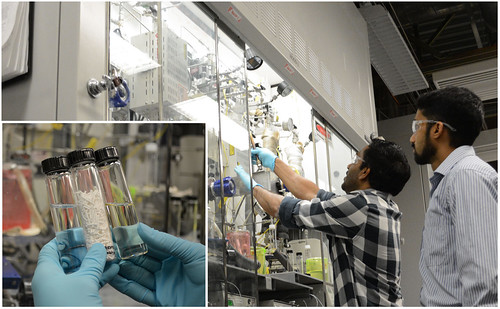Of Catalysts and Coke

Catalysts known as zeolites are vital to fuel production and other processes. Coke deposits in zeolites are a costly problem in petroleum refinement and in petrochemical production.
"Understanding coke molecules in zeolites will provide broad benefits across the refinery and renewable energy industries, and zeolite is one of the most highly utilized catalysts," said Karthikeyan Ramasamy, a chemical engineer at the Department of Energy's Pacific Northwest National Laboratory.
To explore ways to fix the issue, Ramasamy and other researchers from PNNL, with help from DOE's Lawrence Berkeley National Laboratory, zoomed in at the highest resolution yet on these problematic carbon-based deposits.
They found zeolites's porous nature makes it a great chemical catalyst, but also traps tiny clusters of carbon-containing molecules that can ultimately disrupt the catalysis process. An uneven distribution of aluminum in the fresh zeolite catalyst causes an uneven distribution of coke deposits during chemical reactions.
"We wanted to understand this coking mechanism and where it blocks the reaction and how it blocks it. By using a combination of techniques we could compare them to one another and form a complete story," said PNNL materials scientist Arun Devaraj, who co-led the study with Ramasamy.
Some of the work was performed at two DOE Office of Science User Facilities — EMSL, the Environmental Molecular Sciences Laboratory on the PNNL campus and the Advanced Light Source at Berkeley Lab.
Read more in Lawrence Berkeley National Laboratory's news release.
Reference: Arun Devaraj, Vijayakumar Murugesan, Jie Bao, Mond F. Guo, Mirosław A. Derewinski, Zhijie Xu, Michel J. Gray, Sebastian Prodinger, Karthikeyan K. Ramasamy. Discerning the Location and Nature of Coke Deposition from Surface to Bulk of Spent Zeolite Catalysts, Scientific Reports, November 23, 2016, DOI: 10.1038/srep37586.
Legal Disclaimer:
EIN Presswire provides this news content "as is" without warranty of any kind. We do not accept any responsibility or liability for the accuracy, content, images, videos, licenses, completeness, legality, or reliability of the information contained in this article. If you have any complaints or copyright issues related to this article, kindly contact the author above.
